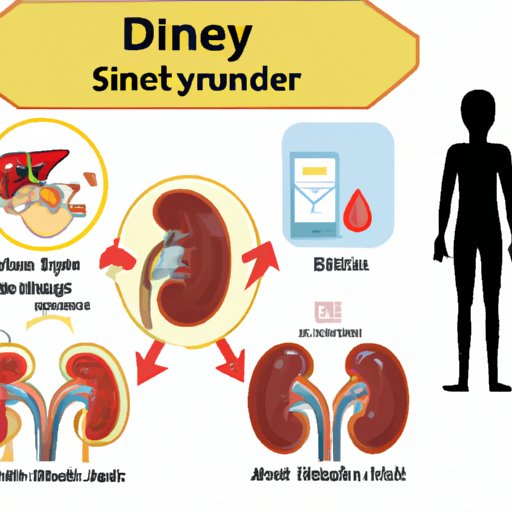
I. Introduction
Kidney disease is a common health problem that affects millions of people around the world. According to the National Kidney Foundation, about 14 percent of adults in the United States have chronic kidney disease (CKD), and many of them may not even know it. Stage 3 kidney disease is a type of CKD that is characterized by a moderate reduction in kidney function.
II. Understanding Stage 3 Kidney Disease: What You Need to Know
Stage 3 kidney disease is diagnosed when a person’s glomerular filtration rate (GFR), which measures how well the kidneys are filtering waste from the blood, falls below 60 but remains above 30. At this stage, people may not have any symptoms, but they are at increased risk for developing complications such as anemia, high blood pressure, and bone disease.
One of the biggest risks associated with stage 3 kidney disease is its potential to progress to more advanced stages of CKD. It is therefore essential to monitor kidney function regularly to detect any changes as early as possible and to manage associated health conditions, such as diabetes and high blood pressure, which can worsen kidney function over time.
III. The Progression of Kidney Disease: Exploring Stage 3
Chronic kidney disease progresses in stages, with each stage characterized by a different level of kidney function. In stage 3, the kidneys are functioning at a moderate level, which means that waste and fluids are not filtered from the blood as efficiently as they should be.
There are various factors that can contribute to the progression of kidney disease, including high blood pressure, obesity, smoking, and a family history of kidney disease. Early detection and treatment of kidney disease can help slow down its progression and prevent complications.
IV. Breaking Down Stage 3 Kidney Disease: Symptoms, Causes, and Treatment Options
Some people with stage 3 kidney disease may not have any symptoms, while others may experience fatigue, swelling in the legs and feet, and changes in urination. The most common causes of stage 3 kidney disease are diabetes and high blood pressure, although other conditions such as glomerulonephritis and polycystic kidney disease can also be contributing factors.
Treatment for stage 3 kidney disease depends on the underlying cause and the severity of kidney damage. Medications such as ACE inhibitors and ARBs can help control blood pressure and protect the kidneys from further damage. Lifestyle changes such as eating a healthy diet, exercising regularly, and quitting smoking can also be beneficial. In some cases, dialysis or kidney transplantation may be necessary.
V. Living with Stage 3 Kidney Disease: Tips for Managing Your Condition
Managing stage 3 kidney disease can be challenging, but there are several things that people can do to improve their kidney function and overall health. Eating a diet rich in fruits, vegetables, and whole grains while limiting salt and protein intake can help reduce the workload on the kidneys. Regular physical activity can also be beneficial for maintaining kidney health and controlling blood pressure.
People with stage 3 kidney disease should also work closely with their healthcare providers to manage any associated health conditions, such as diabetes and high blood pressure. Regular check-ups to monitor kidney function are essential, and people should be sure to take any medications prescribed by their doctor as directed.
VI. The Road Ahead: Navigating Stage 3 Kidney Disease and Planning for the Future
Although stage 3 kidney disease can be overwhelming, it is possible to live a full and active life with this condition. People with stage 3 kidney disease should work with their healthcare providers to develop a plan for managing their condition, which may include regular check-ups, medications, and lifestyle changes.
It is also important to discuss plans for the future, including end-of-life care, with loved ones and healthcare providers. Although it can be difficult to think about these things, having a plan in place can help ensure that a person’s wishes are respected and that they receive the care they need.
VII. Conclusion
Stage 3 kidney disease is a common health problem that affects millions of people around the world. Although it can be challenging to manage, there are many things that people with stage 3 kidney disease can do to improve their kidney function and overall health. By working closely with their healthcare providers and adopting healthy habits, people with stage 3 kidney disease can live a full and active life and plan for the future with confidence.





